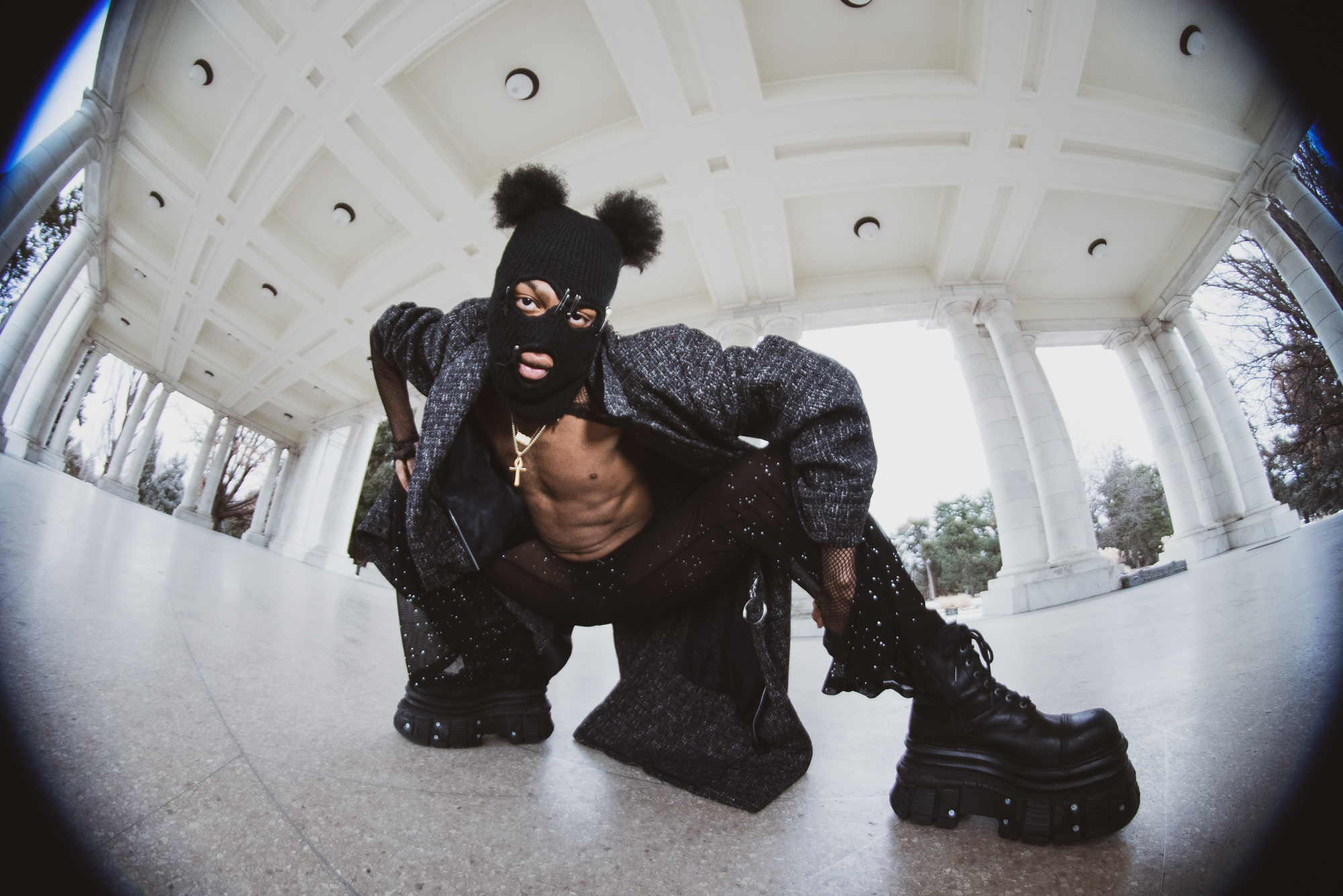Denver’s found its next superstar – N3ptune. He’s powerful, flamboyant and confident but most of all, he’s a modern-day trailblazer paving the way for a new renaissance bubbling up in American society. He’s not exactly a new face in Denver’s music industry, but after dropping the Renaissance EP with Rusty Steve last December, his path to stardom has officially been cemented.
At its core, Renaissance is an autobiographical journey through N3ptune’s many highs and lows. Although N3ptune’s creative narrative, which is told with blunt force and striking imagery, remained at the forefront throughout the listening experience, it’s the sonic atmosphere and daring production carefully crafted by Rusty Steve that brings the project together. From heavily distorted, wildly energetic guitar solos to soft synths and banging percussion, Rusty Steve always gave N3ptune the space he needed to express himself. As N3ptune put it, “Renaissance wouldn’t exist without Rusty Steve.”
Historically, N3ptune hasn’t been interested in collaborative projects. His vision is too clear, too direct. In his own words, he doesn’t “do” creative differences. That’s part of what makes Renaissance so daring. N3ptune stepped out of his comfort zone and into his bag on this project, which he wove with careful precision alongside Rusty Steve as his creative partner.
If you’ve seen N3ptune around Denver during the past few years, you might be surprised to learn that he’s the son of a preacher. His relationship with religion is complicated. On one hand, the church choir gave him his first opportunity to sing in front of a crowd and he continues to draw inspiration from the gospel sound he was exposed to in his youth. On the other hand, religion always told him to repress his creative expression and follow a strict rulebook filled with guidelines that contradicted his personal belief system. It didn’t help that his father, who wholly abandoned N3ptune and his mother, led a hypocritic lifestyle that overtly opposed the sermons he gave every Sunday and eventually resulted in a wedlock baby – N3ptune.
For years N3ptune struggled to express this part of himself through his music but thanks to Rusty Steve, who pressed him to write these feelings down on “WEDLOCK,” the opening track on Renaissance, he finally aired out his childhood trauma. The result is a track that viciously rebels against traditional church rules and challenges his family’s hypocritical history.
N3ptune’s gothic attire and punk aesthetic don’t exactly scream “religious,” nor do the see-through mesh garments he often flaunts over bare skin. However, as N3ptune explained, being raised by a single mother who constantly repressed N3ptune’s creative expression in favor of outward bitterness towards his absent father directly influenced the rebellious and eclectic personality people associate N3ptune with today – especially his risque sense of fashion.
“My expression was tolerated, manipulated and controlled. That’s the reason my fashion has to be bigger, has to be better or has to be skimpier.”
In terms of fashion, most people probably prefer to maintain society’s equilibrium and fit in with their peers. N3ptune, however, sees fashion as a gateway to challenge American masculinity, which he believes is tragically misdirected and completely based on the American industrial age – a time when black people were still drinking from separate water fountains and sitting on the back of the bus, and the gay community was considered “dirty” and “dangerous.” Thankfully, the black and LGBTQ+ communities have made great strides towards equality in the past 50 years, although there’s still a long way to go. American masculinity, on the other hand, has largely remained stuck in the past. The way N3ptune sees masculinity is not defined by the clothes a man wears. Instead, it’s about balance.
“I just don’t think clothes make up your sexuality, and definitely not your gender. Clothes are literally garments. They’re threads. People are so focused on the sexual part. We live in America so everything is sexualized. Redefining masculinity is making it about more than clothes. It’s in your personality, it’s letting yourself talk in a higher register and not having to speak so deep all the time. It’s all about fluctuation, it’s all about balance… men don’t want to admit that they do have feminine traits, it just might not be wearing skirts, heels, nail polish and fishnets. It’s in your expression, in how you do things.”
There’s this idea in American society that men have to be “tough” and suppress their emotions with indifference or power. This is especially true in the hip-hop community, which has historically valued aggressively toxic masculinity and anti-gay sentiments. N3ptune, who began his music career in hip-hop, often felt restrained by these societal influences as he struggled to gain respect as a rapper. Then, he put on the mask.
“When I put on that mask, I started talking about different things [in his music]. I started talking about my addiction to partying. I started talking about my love life. When I took it off, I realized my music wasn’t as honest. It’s almost like when we have something over us, it’s like a shield.”
That was around 2018. Since then, N3ptune’s sound and style have evolved into a more coherent expression of soulful rock ‘n’ roll (“WHITE PONY”) and borderline dance-pop (“MISERY LOVES COMPANY”).
While most of Renaissance is balls-to-the-wall, limitless and loud, N3ptune doesn’t shy away from slowing down and getting deeply personal on the beautifully haunting track “THANK HEAVENS,” which tells the story of his own personal renaissance, and the breaking point that acted as a catalyst for his creative resurrection.
“I literally wrote ‘THANK HEAVENS’ two days after a suicide attempt. I wasn’t coherent for two weeks. I’m still not all the way there.”
That day was almost a year ago. From the outside perspective, it seemed as if N3ptune was doing great. His first interview with 303 Magazine had just been published and he was looking forward to a photoshoot for the cover of Out Front Magazine. The stars were starting to align and the foundation for his massive 2021 year had been established. Behind the scenes though, his best friend had just taken her own life and he was experiencing PTSD from being sexually assaulted during his go-go dancer days. When everything became too much to handle, he made one final phone call.
“I called the one person who I just knew was not gonna answer, but they did. They answered on the last ring and I shattered. I had already shattered, but I was like, they answered. That means it was not time. It just wasn’t meant to be.”
On that day, N3ptune’s own renaissance took form. He began building himself back up, taking the time to reestablish his sanity and work on his mental health. A few months later, he found himself in his own personal heaven on earth as he emptied his apartment to the sound of Playboi Carti’s Whole Lotta Red and practiced performing “WHITE PONY” every day in anticipation of the track’s release.
“I started to have a different outlook on life. I was just like, ‘Whoa, I’m alive.’ It really was a rebirth. Renaissance is ‘rebirth’ in French.
“Everybody has their beliefs. Some have religion, some have other things. Some believe in money, some believe in the man who died on the cross. I believe in the power of self. Not necessarily the human self, but what lies inside. I told myself, ‘I’m abundant. I attract abundance…’ Heaven is a state of consciousness to me.”
While “THANK HEAVENS” is about N3ptune’s personal renaissance, the EP as a whole speaks to something greater — a renaissance of culture.
Throughout history, the black community has always been at the forefront of creative innovation, especially in music and fashion. From jazz and blues to hip-hop and R&B and even rock ‘n’ roll, black artists are the ones who move the culture forward. Sadly, the black creatives who invent a new sound or push the boundaries of visual art and fashion usually don’t receive the credit they deserve. Thankfully, a new renaissance is taking place, once again led by the black community. This time around though, there’s no denying the black influence on our popular culture.
“That’s why Renaissance is so important. It’s just black as hell. And it’s not like ‘I’m black.’ It’s just black in its existence… I’m putting blackness at the forefront, whether even black people like it or not.”
N3ptune is more Malcolm X than Martin Luther King, Jr. Or, perhaps more accurately, he’s more Nina Simone than anything else. He’s angry at the constant mistreatment of black people throughout history. He’s angry that society has found a way to cover their fear of black culture with resounding pity and backhanded compliments. Today, racism is quieter than ever, but it’s still alive and that subtleness is perhaps even more frightening.
“If you feel the excessive need to talk about how you’re not racist and to talk about topics that make you seem not racist, I got my eyes on your ass just as much as another motherfucker who’s blatantly racist. I don’t have to watch my back as much around someone who’s blatantly racist because they don’t wanna be around my black ass.
“The American perception of the black man is forever changing. What it is now is entertainment. It’s still violent, but still entertainment. Black men are tolerated. Our expression is tolerated. Our anger is feared. Our confusion is met with even more confusion. Why? I have no clue when you can Google just about everything.”
As N3ptune gains traction in the music industry, he plans to take his militant, pro-black message and uncompromising effort to redefine masculinity with him. While he prepares to go on his first tour with Sleigh Bells, he suggests people get on the bandwagon before it’s too late.
Currently, N3ptune is raising money for his upcoming tour. If you’d like to support his journey, you can contribute to his GoFundMe here.
All Photography by Roxanna Carrasco









